Best Formula For Breastfed Babies: The Ultimate 2025 Guide
84 hours of research 8 minute read
There are many factors when breastfeeding might not be possible or recommended. The great news is: you can formula-feed your baby and ensure their nutritional needs are met.
Choosing the right formula for your breastfed baby might feel daunting. It is important to remember that no formula is the “best” unless it works for your baby.
If you’re considering introducing formula, this article will help you pick the best formula for your baby. Read on to find more.
When Is Breastfeeding Not Recommended?
There are instances when breastfeeding is not recommended:
- Mother has been diagnosed with any specific illness
- Mother has an infectious disease, like HIV.
- Mother is undergoing chemotherapy treatments.
- Mother is taking certain medications. These medications pass from breastmilk to the baby and can be dangerous for the baby. Therefore, it is always recommended to consult your doctor about all of your medications before breastfeeding your baby.
- Babies are born prematurely and need different kinds of nutrition.
- Babies born with rare genetic diseases, such as galactosemia or phenylketonuria.

Reasons For Introducing Formulas To Your Breastfed Baby
There are many reasons for introducing formula to your breastfed baby, including both personal and medical. The following are some primary reasons:
- You fear that the baby isn’t getting enough breast milk.
- You’re returning to your job where you cannot breastfeed your baby, or you don’t have space to pump breast milk.
- Your baby has trouble suckling, or your milk supply is low (this can happen when you have low weight or you’ve had breast surgery).
- You find it uncomfortable to breastfeed in public.
- Your baby is not gaining weight.
What Are Different Types Of Infant Baby Formulas?
There is a wide range of infant formula brands and formulations. Some formulas are organic, while others are non-organic. However, all formulas fall into the following categories:
1. Milk-Based Formula
Most European baby formulas are cow’s milk-based that undergo modifications to mimic breast milk. These formulas are beneficial for the baby because they’re easy to digest and contain the right balance of nutrients. Some babies can tolerate cow’s milk well, but some babies are allergic to cow’s milk protein and require other kinds of formula.
2. Soy-Based Formula
Soy-based formulas contain soy protein and are suitable for babies allergic to lactose (a natural sugar found in cow’s milk) or cow’s milk formula. However, soy-based formulas are manufactured with added and processed ingredients that are not safe for the infant digestive system. Also, if your baby is allergic to cow’s milk, they can also be allergic to soy milk.
3. Hypoallergenic Formula
Hypoallergenic formulas may be amino acid (without protein peptides) formulas or protein hydrolysates (the protein that has been extensively or partially broken down into smaller sizes than those found in soy-based or milk-based formulas). If your baby has digestive issues or is allergic to soy-based or milk-based formula, you should try giving hypoallergenic formula.
So, Which Formula Should You Use?
There are many formulas that you can choose from to meet your baby’s nutritional requirements. However, it is essential to know that “no formula is the best unless it suits the digestive system of your baby.” Organic Life Start has found some formulas that can be a good start for your breastfed baby:
1. HiPP Dutch Formula Best Seller
✓ Contains Probiotics & Prebiotics
✓ No sugar, no corn syrup, no soy
✓ No starch
✓ HiPP's most popular formula
Check PriceHiPP Dutch Stage 1 is our best-selling and the best alternative to breastfeeding. It closely resembles breast milk. If your baby is six months or older, HiPP Dutch Stage 2 is best with the same great ingredients.
-
Why Choose HiPP Dutch?
- It contains prebiotics and probiotics.
- No Maltodextrin or Strarch.
- Certified to EU standards.
- Contains DHA for brain development.
- Has no soy, corn syrup, added sugar, and GMOs.
- Comes in different stages as per your baby’s age.
✓ Clean formula ingredients
✓ Demeter biodynamic certified
✓ Contains natural whey, DHA, & ALA
✓ Holle's most popular cow formula
Check PriceHolle Cow Milk formula is perfect for exclusive bottle-feeding or supplementing with breast milk. 99% organically grown ingredients and Demeter certification are what make Holle Cow formula great. The formula is easily digestible and provides your newborn with all the necessary nutrients.
-
Why Choose Holle Cow?
- Milk is obtained from cows fed on biodynamic farms (highest organic standards).
- The formula strictly adheres to regulations of the EU Commission.
- Demeter certification.
- It contains maltodextrin, and organic starch makes the formula thicker and creamier.
- No GMOs, gluten, and soy.
- Contains DHA for brain development.
✓ Clean formula ingredients
✓ Demeter biodynamic certified
✓ Contains natural whey, DHA, & ALA
✓ Contains A2 milk protein for easier digestion
Check PriceHolle Cow A2 formula The formula contains A2 milk sourced from specific cows, which produce only A2 beta-casein protein. This formula includes A2 milk because the structure of A2 proteins closely resembles breast milk and is easier to digest. This is why it is perfect for infants.
-
Why Choose Holle Cow A2?
- It contains A2 beta-casein, which is more beneficial and easily digested by infants.
- No tummy pain, bloating, or gas after feeding.
- Milk is obtained from cows fed on biodynamic farms (highest organic standards).
- No GMOs, gluten, and soy.
- Contains DHA for brain development.
✓ Contains Probiotics & Prebiotics
✓ No sugar or corn syrup
✓ No soy
✓ HiPP's original formula
Check PriceHiPP German Combiotic formula is a perfect addition to your infant’s diet and suitable from birth onwards. This easy-to-digest and all-natural formula is best known for its 100% organic ingredients that are selected according to European standards. The formula is easy on the baby’s digestive system because of prebiotics and probiotics.
-
Why Choose HiPP German?
- Lactose is the natural sweetener in this formula.
- No GMOs, soy, wheat, gluten, and synthetic preservatives.
- Contains DHA and ARA for healthy vision and the nervous system.
Lebenswert formula The formula comes in 3 stages, and all stages are full of essential nutrients and vitamins. The formula is entirely lactose-based and suitable from birth to 6+ months.
Check Price-
Why Choose Lebenswert?
- 100% organic formula with no GMOs and synthetic additives.
- It contains essential proteins that your baby requires in the early stages of life.
- It contains high amounts of calcium to support healthy bones.
- Milk obtained from cows raised in Bioland organic farms.
- No GMOs, gluten, and soy.
- Contains DHA for brain development.
✓ 100% Organic Formula
✓ No sugar, no corn syrup, no soy
✓ No starch
✓ Popular formula against constipation, indigestion, or gas
Check PriceHiPP UK formula is designed to be gentle on a baby's delicate digestive system. It aims to provide easy digestion and may be suitable for babies with sensitive stomachs.
-
Why Choose HiPP UK?
- Contains vital prebiotics in all stages.
- No Maltodextrin or Starch.
- High quality organic formulation.
- Nutrition near FDA & USDA guidelines.
- Contains DHA and ARA
- Has no soy, corn syrup, added sugar, or GMOs.
- Gluten-free and egg-free
✓ Whole Milk as a Natural Mammal Fat Source
✓ Contains Plant-Based DHA and ARA
✓ No sugar, no corn syrup, no soy, no palm oil
✓ EU and British Soil Association Certified Organic
Check PriceCrafted with EU-certified organic cow's whole milk from Red Tractor-accredited farms, Kendamil Organic formula offers three stages of passionately crafted organic options. Dedicated to mimicking natural breast milk, Kendamil uses full cream cow's milk and incorporates a natural fat source Milk Fat Globule Membrane (MFGM) for cognitive development.
-
Why Choose Kendamil Organic?
- Full Cream EU Certified Organic Milk.
- Palm Oil Free.
- Vegetarian Friendly.
- Prebiotics plus Plant-Based DHA and ARA.
- Main Carbohydrate is Lactose.
- EU and British Soil Association Certified Organic.
- No GMOs, gluten or soy.
✓ 100% Vegetarian Formula
✓ Contains Plant-Based DHA and ALA
✓ No sugar, no corn syrup, no soy, no palm oil
✓ Made from full cream cow's milk
✓ Kendamil's most popular go-to infant cow's milk formula
Check PriceKendamil Classic formula is carefully designed to replicate the whey:casein ratio found in natural breast milk, featuring an easily digestible 60:40 whey/casein blend. Kendamil also sources its plant-based DHA from marine algae, making it a suitable option for vegetarian families.
-
Why Choose Kendamil Classic?
- Full Cream British Milk
- Palm Oil Free
- Vegetarian Friendly
- Vitamins C, A, D, Zinc Fatty acids (ALA/LA)
- Main Carbohydrate is Lactose
- 100% Non-GMO formula
✓ Allergy-Friendly (No Gluten, Wheat, or Nuts)
✓ Omega 3 & 6 LCPs (DHA & ALA)
✓ Ethically sourced ingredients
✓ Patented prebiotics for healthy gut and immune system development
Check PriceAptamil Nutribiotik is suitable for infants from birth through 6 months as a complete substitute to breast milk, or from birth through 1 year of age if substituted with additional meals. It features a patented mix of natural prebiotics that support the growth of beneficial gut bacteria. Scientific oligosaccharides promote Bifidobacteria and Lactobacilli while inhibiting harmful bacteria. A balanced gut is vital for your baby’s digestion and immunity as they grow.
-
Why Choose Aptamil Nutribiotik?
- Contains essential vitamins and minerals
- No gluten, wheat, or nut ingredients
- Free from artificial chemicals, preservatives, and flavors
- Contains patented prebiotics
- Iron-fortified
- No added sugars
- Has added DHA for brain and eye development
10. Aptamil Gold+
✓ Allergy-Friendly (No Gluten, Wheat, or Nuts)
✓ Omega 3 & 6 LCPs (DHA & ALA)
✓ With Prebiotics and Probiotics
✓ Offers a unique blend of key nutrients for babies
Check PriceAptamil Gold+ is a carefully crafted cow's milk formula, free from GMOs. It's designed to match growing infant nutritional needs. Packed with probiotics, prebiotics, and crucial DHA, this advanced blend supports your baby's overall health. DHA aids brain and eye growth, and GOS promotes a balanced gut for digestion.
-
Why Choose Aptamil Gold+?
- Enriched with Vitamin D, Calcium, Vitamin C and Zinc
- No gluten, wheat, or nuts ingredients
- Free from artificial chemicals, preservatives, and flavors
- Iron-fortified
- No added sugars
- Has added DHA for brain and eye development
- Contains Prebiotics and Probiotics
Best formula If Your Breastfed Baby Has Special Conditions
If your baby is having any health issues, like constipation, colic, or allergies, you should give them a formula that could really address that issue. The following chart contains some best formulas if your baby has special conditions:
| Best formula for sensitive babies | What is it used for? | What does it do? |
|---|---|---|
| HiPP Hypoallergenic formula (HA) | When the baby:
|
|
| HiPP Dutch HA | When the baby:
|
|
| HiPP Anti-Reflux (AR) formula | When the baby has issues with:
|
|
| HiPP Comfort | When the baby has:
|
|
| HiPP UK Comfort | When the baby has:
|
|
| Holle Goat | When the baby cannot tolerate cow’s milk well because of an allergy to cow’s milk protein. |
|
| Holle Goat Dutch | When the baby:
|
|
| Aptamil Pepti | When the baby:
|
|
| Aptamil Comfort | When the baby:
|
|
| Aptamil Anti Reflux | When the baby has issues with:
|
|
| Kendamil Goat | When the baby is intolerant of cow's milk formulas, as well as when parents are looking exclusively for the most natural ingredients that can be found in baby formula. |
|
| Kabrita | When the baby is sensitive to cow’s milk or has digestive sensitivities. |
|
| Nannycare | When the baby is prone to:
|
|
How To Introduce Formula To A Breastfed Baby?
We bring you a few tips that can make the transition of a breastfed baby to a formula bottle easier:
- While formula feeding, try paced bottle feeding. This makes bottle feeding move at a pace similar to breastfeeding to keep the baby at ease.
- Take it slow to give your baby time to adjust. You can start by replacing one feeding per day with a formula bottle.
- Sometimes, babies associate mom's smell with breastfeeding; thus, allowing someone else like your partner or a family member to offer your baby the formula bottle can be beneficial.
- Try changing position for bottle feeding as the usual breastfeeding spot may give the baby cues that you are about to breastfeed.
- Avoid switching to formula bottles when your baby is sick, teething, starting daycare, as this can make the transition harder.
How To Give Your Baby A Bottle Of Milk Formula?

Here are some instructions that can help you to give your baby a bottle quickly;
- Follow the formula preparation instructions closely, including boiling water and letting it cool to kill any kind of bacteria present.
- A sterilized bottle with a clean and slow-flow nipple is especially useful for young and previously breastfed babies.
- For easy swallowing, the upright position of the formula bottle is advantageous.
- Gently brush the baby’s lips with the bottle’s nipple to make the baby adapt faster.
- In the case of a flat nipple, gently put your finger in your baby’s mouth to make the nipple reinflate.
- After feeding, gently rub your baby’s back while holding them on your shoulder and allow them to burp.
How To Give Your Baby A Bottle Of Milk Formula?
When it comes to infant nutrition, parents often wonder: Is formula heavier than breast milk? Is breast milk more filling than formula? Is formula thicker than breast milk? Both breast milk and formula can provide a feeling of fullness for babies. The distinction lies in the digestion process: breast milk is digested easier than formula, resulting in more frequent feedings. Conversely, infant formula may take longer to digest and may be perceived as more filling compared to breast milk. Although formula's consistency can vary, it's generally designed for easy digestion, whereas breast milk's thinner consistency aids in quicker digestion, giving the impression that it's thinner than formula. Understanding these differences is crucial for making informed feeding choices for your baby's well-being.
Best Formula For Breastfed Babies
At times when breastfeeding is not recommended, mothers can opt for the infant formula that is nutritionally complete. Organic Life Start provides a wide variety of baby formulas of European organic brands, including HiPP, Holle, and Lebenswert. All these formulas replicate the nutritional benefits of breast milk. If your baby has special conditions, like constipation, allergy, or gas, you can also choose from HiPP and Holle formulas to combat these issues.
In addition to selecting the best formula for breastfed babies, it's crucial to consider other feeding essentials tailored to their needs. When transitioning from breastfeeding to bottle feeding, choosing the best bottles for breastfed babies as well as the best pacifiers for breastfed babies designed for their unique feeding patterns can ease the process for both baby and parent.
Moreover, addressing concerns and questions like “Does breast milk make babies fuller than formula” underscores the importance of finding a formula that closely resembles breast milk's composition. Opting for formula most like breast milk ensures your baby receives comparable nourishment. This consideration is significant when selecting the best formula to supplement breast milk. The formulas mentioned in this blog are specifically formulated to replicate the nutritional benefits of breast milk while addressing common infant digestive issues. Remember, every baby is unique, so consulting with your pediatrician can provide personalized guidance on feeding choices that best suit your baby's needs and ensure their optimal growth and development.
3 Most Popular Formulas For Breastfed Babies
Organic Life Start is committed to providing accurate, reliable, and trustworthy information to parents and caregivers. We carefully choose credible sources and follow a meticulous fact-checking process to uphold the highest standards in infant nutrition and parenting advice. To learn more about our dedication to accuracy, please explore our editorial guidelines.
Link To Sources
- https://norasnursery.com/blogs/how-to/the-12-month-sleep-milestone-encouraging-independent-sleep
- https://kidshealth.org/en/parents/breast-bottle-feeding.html
- https://www.nhs.uk/start-for-life/baby/feeding-your-baby/mixed-feeding/introducing-formula-feeds/
- https://www.whattoexpect.com/first-year/feeding-baby/things-to-know-about-breastfeeding-and-formula-for-baby/
- https://raisingchildren.net.au/newborns/breastfeeding-bottle-feeding/bottle-feeding/mixed-feeding


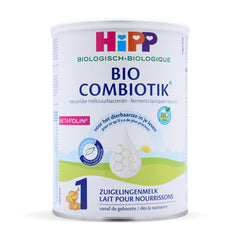

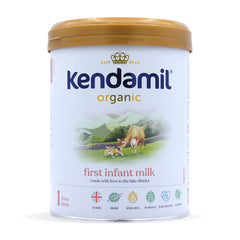
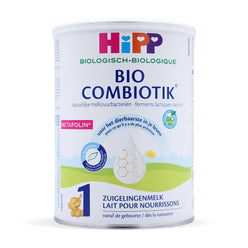
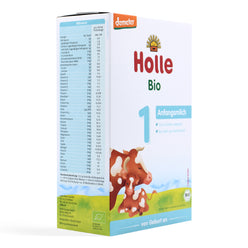



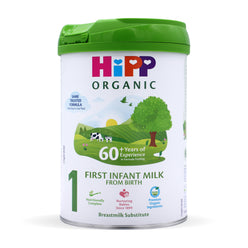
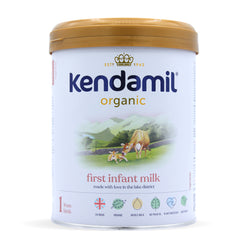
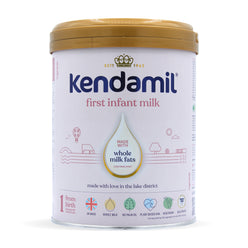
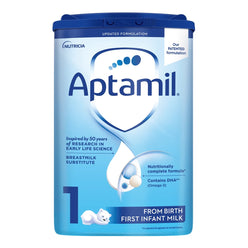
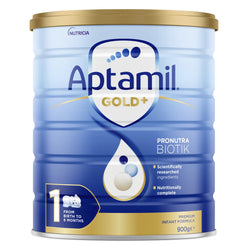






Judith -
Based on personal experience, my baby did best with Kendamil Classic. I tried 5 different formulas, Kendamil Classic has the best nutrition, best consistency, and it smells and tastes great too!
Aaliyah G -
January 29, 2026
Can you please share more information on how to physically transition from breast milk to formula? Our main challenge is that our baby is used to direct-latch feeding. She refuses the bottle because she is probably not used to the nipple. What’s your advice so we can start? We have Hipp German Stage 1 now, but we do not know yet if it matches our baby, since she refuses to bottle-feed. And as a Mom, I cannot stand to see her crying, so I will let her latch. And the cycle continues! We would like to fully transition her to forrmula, but we cannot even start.
Will K -
January 19, 2026
I’d love to hear more about how to choose the best formula for breastfed babies who are sensitive to certain ingredients. It would be great to understand what specific nutrients to look for and which ones to avoid. I’m also curious about how to tell if a formula is truly easier on digestion. Thanks for any extra details!